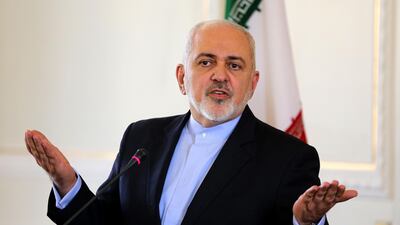Iran’s Foreign Minister arrived on Saturday in Baghdad to meet his Iraqi counterpart and other officials, Iranian media reported.
State news agency Irna said Mohammad Javad Zarif will meet with Iraqi Foreign Minister Mohamed Alhakim, Iraqi President Barham Salih, and Prime Minister Mohammed al-Halbousi during his two-day visit.
Iraq's Foreign Ministry spokesman said Mr Zarif will discuss the situation in the region and ways of finding common ground.
Earlier on Saturday, Mr Zarif said an order by US president Donald Trump to send 1,500 additional troops to the Middle East was “extremely dangerous” and threatening to international peace and security.
“Increased US presence in our region is extremely dangerous and a threat against international peace and security and it must be addressed,” Mr Zarif was cited as saying by the state-run Islamic Republic News Agency.
An adviser to the Islamic Revolutionary Guard Corps, General Morteza Qorbani, was quoted by semi-official Mizan Online news saying Iran could sink a US aircraft carrier with “new weapons” at the “slightest” provocation by the vessel.
The comments came after Mr Trump confirmed the military deployment and Pentagon officials said they believed that Iran was behind a number of recent attacks on oil tankers, a Saudi pipeline and the diplomatic quarter of the Iraqi capital, Baghdad.
On Friday, Mr Zarif met officials in Pakistan as tensions have ratcheted up in the Middle East. The White House earlier this month sent an aircraft carrier and B-52 bombers to the region in response to a still-unexplained threat from Iran. The US plans to send 1,500 additional troops to the Middle East amid heightened tensions.
“The Americans make such allegations in order to justify increasing tensions in the Persian Gulf and to justify their hostile policies,” Mr Zarif said in reference to the Pentagon’s claims as he departed Pakistan.
Tensions between Iran and the US have escalated dramatically over the past months after the White House vowed to force Iran’s oil exports down to zero and revoked a series of key sanctions waivers for the OPEC-member’s crude sales and its civilian nuclear program.
In response, Iran has said it will scale back some of its commitments under the 2015 nuclear accord and set a deadline to start its own gradual withdrawal from the deal unless Europe can guarantee it can function and survive.
* With Agencies

